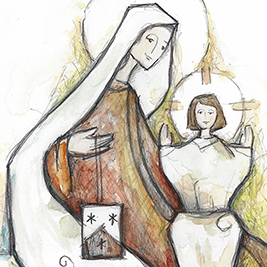Carmelite homily for the Fourth Sunday of Ordinary Time, January 28, 2024 – Lectionary 71 (Mark 1:21-28)
The Greek word for ball is “bollus.” It is where we get our word “ball” from. And if we take a ball and we divide it we have two balls – “di-bollus.” That’s where we get our word “diabolical” from: to divide something; to take a unity and make it two things. This is where we get our word “diabolical” and the shortened form is “devil.” This is the mission of the devil: to separate. And we see this in today’s gospel. Jesus comes into the synagogue. We’re at the beginning of Mark’s Gospel and this is the function of Jesus in Mark’s Gospel: to reconnect. So he goes into the synagogue and there’s a man with an unclean spirit and he drives out that devil. This man is divided; he has two beings in him. And whether we take it literally or metaphorically, this man is divided. And that’s what Jesus’ vision is, is to reconnect, to rejoin. This is the word “religion.” To rebind; that’s what religion means – to reconnect or to rebind. That’s Jesus’ mission throughout the Gospel. Whatever is separated, whether it is by superiority or judgment or sickness or the devil. Anything that separates, Jesus reconnects, recombines.
I think that is the mission of spirituality; that’s the journey of spirituality. In the Spiritual Canticle by Saint John of the Cross we see this culminating unity with God. This complete re-lig-ion with God. In the betrothal verses: “There he gave me his breast. There he taught me a sweet and living knowledge. There I gave myself to him, keeping nothing back. There I promised to be his bride.”
This beautiful marriage rite of two becoming one is how John of the Cross sees our spiritual journey – not only unity with each other, but unity with God. To rebind, re-lig-ion, rejoin. Not to divide, that’s the work of the devil, but to combine, to unify – the work of God.





